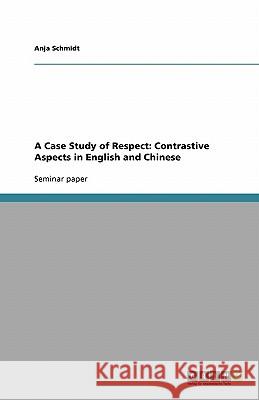A Case Study of Respect: Contrastive Aspects in English and Chinese » książka
A Case Study of Respect: Contrastive Aspects in English and Chinese
ISBN-13: 9783638758628 / Angielski / Miękka / 2007 / 40 str.
Seminar paper from the year 2003 in the subject English Language and Literature Studies - Linguistics, grade: 1,3 (A), University of Hamburg (IAA), 12 entries in the bibliography, language: English, comment:, abstract: One major assumption in the study of emotions is the idea that our understanding of emotion metaphors is, to a large extent, based on bodily experience. Although most evidence for this claim has been found in analyses of the English language, Chinese emotions seem to be conceptualised to a large degree in the same way as in English. Previous studies on the concepts of ANGER and HAPPINESS come to the conclusion that English and Chinese only vary in minor aspects, due to cultural differences. But how about the more peripheral type of emotions? Do these show the same metaphorical preferences? Or are they even more culture-specific? In this paper I will show the different metaphorical realization of RESPECT in English and Chinese and offer some suggestions as to why these differences occur. For this analysis I have considered a set of about 140 sentences and idioms in English and Chinese. After considering these sample sentences, it will become evident that these two languages most likely follow the same major metaphorical principles. English and Chinese share important concepts such as GOOD IS UP or THE OBJECT OF RESPECT IS A VALUABLE COMMODITY. And this shows in the metaphorized expressions of respect. It seems, though, that Chinese is far more restricted in the use and meaning of these respect metaphors.











